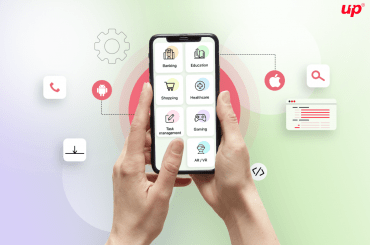Establishing the app’s precise business goals and functions will serve as one of several stages that might go into developing an enterprise app to accelerate corporate growth. This may involve increasing sales, streamlining internal processes, improving client interactions, and conducting market research to identify the best features and functionality for the Enterprise App Development and potential competitors.
designed the app’s user interface and user experience to be simple. Following that, I’m putting together the back-end infrastructure, which includes a database to manage and store data and an API to make it easier for the app to communicate with the back end.
It is Develop Enterprise App the front-end and back-end programming for the app. Therefore, choosing the right frameworks and programming languages for the project’s specific needs is crucial.
So that people may use the app, it should be made available on the appropriate platforms (such as iOS, Android, and the web).
Monitoring the program’s performance, fixing any faults or issues as they arise, and adding updates and improvements as required.
The app is advertised and promoted to its target audience to increase recognition and adoption.
Remember that this is a high-level view, and that the development process may be difficult and lengthy. If you are new to app development, consider working with an established app development company or a group of app developers.
What is the goal of developing corporate applications?
Enterprise application development is the process of creating software programs that are specifically meant to be used inside of a business or corporation. These programs are usually developed in response to specific company requirements to streamline internal processes and increase productivity.
Examples of typical business use include:
⦁ Customer relationship management (CRM) solutions organize consumer interactions and data.
⦁ Enterprise resource planning (ERP) systems, which assemble and automate many business processes
⦁ Systems for controlling the transportation of materials and goods, or supply chain management (SCM),
⦁ Systems for human resource (HR) management that deal with tasks related to maintaining employee data.
An enterprise application development team typically consists of developers, designers, and project managers to build and deliver the finished product. It also requires a detailed understanding of the business requirements, IT infrastructure, and relevant sectors.
Because of the increased number of features, scalability, security and compliance requirements, and connectivity with existing systems, the development process for business apps is typically more difficult and time-consuming than for consumer applications.
How might corporate app development help your business grow?
The following are a few ways why creating corporate apps could help your business grow:
Automation of company processes: Enterprise apps can help staff members work on more important and valuable tasks by automating time-consuming and repetitive tasks like data entry and reporting.
Enhanced efficacy and productivity: Employees with real-time access to data and tools may make quicker, more informed decisions thanks to workplace apps.
Growth in sales and revenue: Enterprise apps can help businesses engage with and interact with customers in fresh ways, including through mobile ordering or specialized marketing campaigns.
Better customer support is possible with business applications, giving customers options for self-service like appointment booking or order tracking. This will increase customer happiness and loyalty.
Cost savings: Enterprise apps can aid businesses in reducing costs by streamlining internal procedures, doing away with manual labor, and reducing the necessity for paper-based processes.
Competitive advantage: Organizations can offer clients unique or cutting-edge services and improve the overall customer experience by implementing enterprise apps.
Designing and constructing your enterprise app with an understanding of your business’s goals and target market can help your firm expand. It’s crucial to market and sells the app correctly, periodically check on it, and improve it based on user feedback if you want to reach your target audience.
What are the most liked Business Apps on the Market right now?
Many business apps have been successful. However, the following are some of the more well-known and popular ones:
Microsoft Office 365 is a collection of applications and services that provides well-known programs like Word, Excel, and PowerPoint, together with cloud-based collaboration and communication features.
Slack: An application that facilitates file sharing and instant chat for team collaboration and communication.
SAP: An Develop Enterprise App resource planning (ERP) technology that aids businesses in controlling and automating a variety of operations, including supply chain, human resources, and finance.
⦁ Workday is a cloud-based HR management platform that helps businesses manage employee data and handle HR-related tasks.
⦁ A cloud-based customer service platform, Zendesk helps businesses manage support requests and customer interactions.
Asana: A tool for project management and collaboration that facilitates work tracking and team organization.
DocuSign: A system for securely signing and archiving documents that manage digital signatures.
These are just a few examples of well-known corporate apps, and the market is constantly evolving as new innovative solutions are introduced. You can choose the best corporate software that meets the specific needs of your business by conducting extensive research and weighing your options.
What function will business applications have in the online environment?
The following developments are projected to have an impact on the creation of enterprise applications in the digital sphere:
Cloud-based solutions: More and more enterprise apps are being developed and offered as cloud-based solutions due to their scalability, accessibility, and affordability.
Artificial intelligence and machine learning are increasingly employed in business applications. They include functions like predictive analytics, natural language processing, and automated decision-making.
IoT: “Internet of Things” IoT is projected to play a crucial part in the future of corporate apps since sensors and devices are generating real-time data that can be used to optimize and automate many company operations.
Low-code and no-code solutions: Low-code and no-code platforms are gaining popularity because they help businesses create and deploy corporate apps more quickly and easily.
Corporate software that is mobile-first and progressive web apps (PWAs): As more workers work remotely and require access to enterprise software via mobile devices, the trend toward mobile-first workplace apps is expected to continue. PWAs, or progressive web apps, are gaining popularity because they can be used offline and on any device.
Security and compliance: As enterprise apps store and manage more data and sensitive information in the future, security and compliance will become increasingly important.
⦁ The auto influence on the creation of enterprise apps.
⦁ The widespread consensus is that workplace apps will advance in intelligence, connectivity, accessibility, and safety as the digital ecosystem develops.
What efficiency gains may enterprise application development provide to your business?
Creating corporate applications can increase your business’ productivity in various ways.
Business procedures are automated: Because repetitive and time-consuming tasks like data entry, reporting, and document management are automated by enterprise apps, staff can concentrate on more critical and value-adding tasks.
Better data management: Thanks to corporate apps, employees with real-time access to tools and data may decide more quickly and accurately.
Collaboration and communication are streamlined: Employees can work more productively with one another both inside and outside of their teams by using enterprise apps.
Gains in productivity: Enterprise apps can improve employee productivity by providing them with the tools and information they need to finish their task more quickly.
⦁ Making better decisions Enterprise apps can provide real-time data and analytics that can aid managers in making better decisions by giving them a clearer picture of how the organization works.
⦁ Savings on costs Enterprise apps can assist businesses in reducing costs by streamlining internal procedures, doing away with the need for human labor, and reducing the necessity for paper-based processes.
Enhanced customer service: Clients’ satisfaction and loyalty can be raised by providing them with self-service options like appointment scheduling or order tracking through business applications.
Overall, enterprise application development can improve business operations by providing employees with the tools and information they need to execute their tasks more quickly and effectively.
FAQs
Q. What is the most critical component of a business application?
Business processes must be supported and streamlined for an organization to function better in terms of productivity, efficiency, and overall effectiveness. Examples of such tasks include inventory management, sales monitoring, customer data management, and encouraging employee collaboration and communication.
Q. Which approach is ideal for creating apps?
Agile testing ensures no flaws, faults, or defects in the final mobile application released to the market. A team of skilled testers, including UX-UI designers and app developers, are in charge of testing, which is crucial.
Q. Which language is most appropriate for creating apps?
The ideal programming language for developing apps will rely on the particular requirements of your project. Hence there is no universally applicable solution. But a few well-liked options for creating apps are as follows:
⦁ Swift for the creation of iOS apps
⦁ Kotlin for developing Android apps
⦁ JavaScript for building cross-platform apps (using frameworks such as React Native or Ionic)
⦁ development of Windows apps using C#
Depending on their specific needs, some developers prefer to use alternative languages for app development, such as Python, Java, or C++. Finally, your team’s expertise, the project’s complexity, and the platform(s) you intend to use will all influence your programming language choice.








